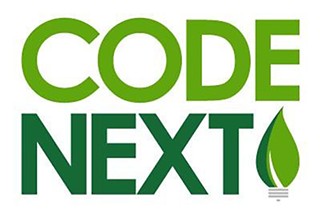Tracking CodeNEXT ... Or Not?
Commissioners express concern over data collection of land use rewrite
By Sarah Marloff, Fri., Sept. 1, 2017
CodeNEXT Version 2.0 is due in two weeks, and Planning and Zoning and Platting commissioners have concerns about the way the city's tracking programs and code factors during the cumbersome land use rewrite. During a joint meeting held Tuesday, Aug. 29, commissioners and presenters alike lamented the city's collection of necessary data. Eliza Platts-Mills, a professor at UT School of Law and one of four fair housing experts offering feedback on the code's affordability chapter, urged the city to collect more info on where affordable units are located today (and who is currently living in them); ZAP Vice Chair Jim Duncan agreed, saying "we" have no grasp of the effectiveness of developer incentives. Duncan gave two presentations on compatibility and affordability, and chastised the city's existing density bonus programs for being poorly monitored, confusing, and outdated. While Platts-Mills was supportive of the proposed broader affordability incentives, she encouraged CodeNEXT to further expand the program. Because affordability incentives aren't offered in zones smaller than T4 (to be renamed in v2.0), the Fair Housing representatives recommend the expansion of T4 zones in additional neighborhoods, especially in West Austin. They also suggested creating an "Affirmative Market Plan" to reach families "least likely to hear about [affordable units] and who most need them."
During a presentation on nonconforming structures by assistant city attorney Brent Lloyd, ZAP commissioner David King pointed out that the city does not keep track of existing nonconforming buildings. CodeNEXT's executive project lead Greg Guernsey confirmed: He is not aware of an existing database, but assured commissioners that the goal of CodeNEXT "is to make more complying structures over time," not the other way around – as many residents fear that the rewrite will make many existing buildings nonconforming. Overall, Lloyd's presentation seemed to inspire more questions than answers. Hopefully, when the consultants return for the joint meeting on Sept. 5, they can clear up some of the confusion. As PC Commissioner Nuria Zaragoza said at the close of Tuesday's meeting: "We're in a very vulnerable position to vote on something we don't fully understand," referencing the quick turnaround between draft two and draft three's Nov. 28 release. "Sometimes you may need to spoon-feed us information we're not going to get otherwise."
Got something to say on the subject? Send a letter to the editor.











